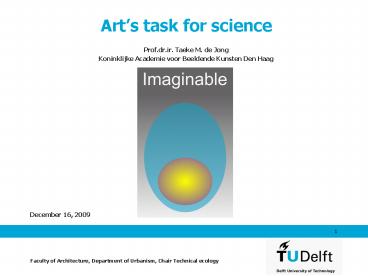Arts task for science - PowerPoint PPT Presentation
1 / 23
Title: Arts task for science
1
Arts task for science
- Prof.dr.ir. Taeke M. de Jong
- Koninklijke Academie voor Beeldende Kunsten Den
Haag
Faculty of Architecture, Department of Urbanism,
Chair Technical ecology
2
empirical science, design and art
3
the usual view (co-editor vd Voordt)
4
a plausible view
5
design study
- For example Architecture at a University
- Context sensitivity
- Other categories describing design issues
- Methodology to make use of each others progress
- Scientific justification
6
da Vinci 1509, Harvey 1628
7
science supposes design,not the reverse
- Probability supposes possibility
- Imaginations and designed instrumentsprecede
scientific progress - Design uses empirical resultsbut produces
something else - Science is not necessarily part of designbut of
its realisation
8
advantages of scientific educationfor design
http//www.turbosquid.com
9
advantages of scientific educationfor design
- Less vulnerable in their company
- Natura Artis Magistra
- Balancing and integrating specialists
advicesinto a design concept
10
emerging problems of science
Cern
11
emerging problems of science
- Diverging specialisations
- Facts no longer imaginable
- Science falling in public esteem
- A demand for imagination
12
arts task
13
arts task
- A lack of imagination
- Global homogenisation
- Decreasing awareness of the real diversity
- The combinatory explosion of possibility
14
back to childhood
15
back to childhood
- Exploring the incomparable
- Combining different sensory impressions
- Concept formation
- Moving experience
- Object constancy
16
composition
17
composition
- Components and details
- Different components
- Tension
- Observable variables or differences
- Resolution
18
the vocabulary of image and sound
19
the vocabulary of image and sound
- Categories of design legends, notes, intervals
- A vocabulary of drawing and music
- Characteristic, crucial, connecting and marking
details - Three visual examples of style and scale
20
exploring possibility,limitations of imagination
http//www.reconstructivism.net/
21
exploring possibility,limitations of imagination
1 Without difference, nothing can be chosen,
imagined or realized. 1.1 'Attention' supposes
difference. 1.2 'Boundary' supposes a difference
of object and context. 1.3 'Variation' supposes
different differences. 1.4 'Comparison' supposes
equality in difference. 1.5 'Reduction' supposes
less difference than impression. 1.6 'Identificati
on' supposes difference of location or
occasion. 1.7 'Image' supposes difference of
identification 1.8 'Criterion' supposes a chosen
difference. 1.9 'Variable' supposes a
set 1.10 'Legend' supposes difference in location
and attribute 1.11 'Imagination' supposes
different reductions 2 'Change' supposes a
difference without denial. 3 'Coherence'
supposes duration in change. 4 'Isolation'
supposes freedom in coherence. 5 'Selection'
supposes consistency in isolation. .
22
conclusion
23
conclusion
- Truth, probability, possibility and imaginability
- Improbable possibilities
- Science as design
- Instruments of imagination
- Condition and cause
- Supposition and definition
- IMAGINATION































